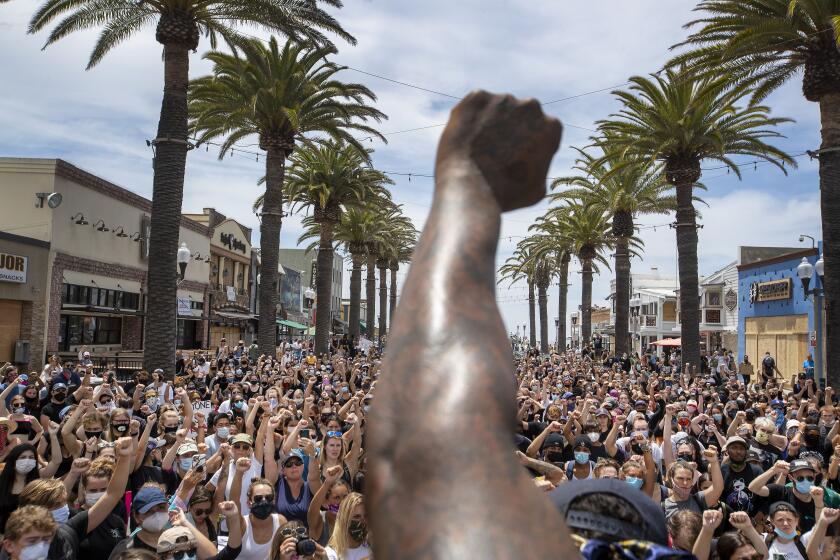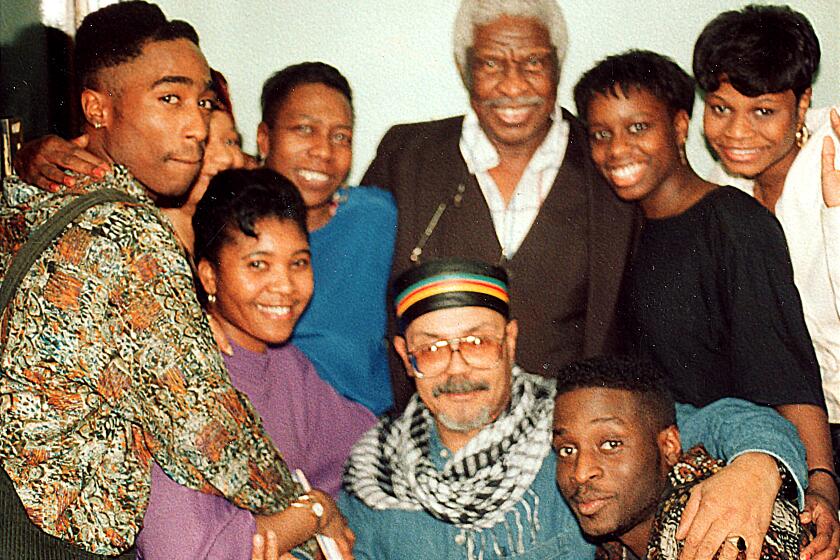Frantz Fanon, the original ‘decolonizer,’ is as chic as ever. But who was he?
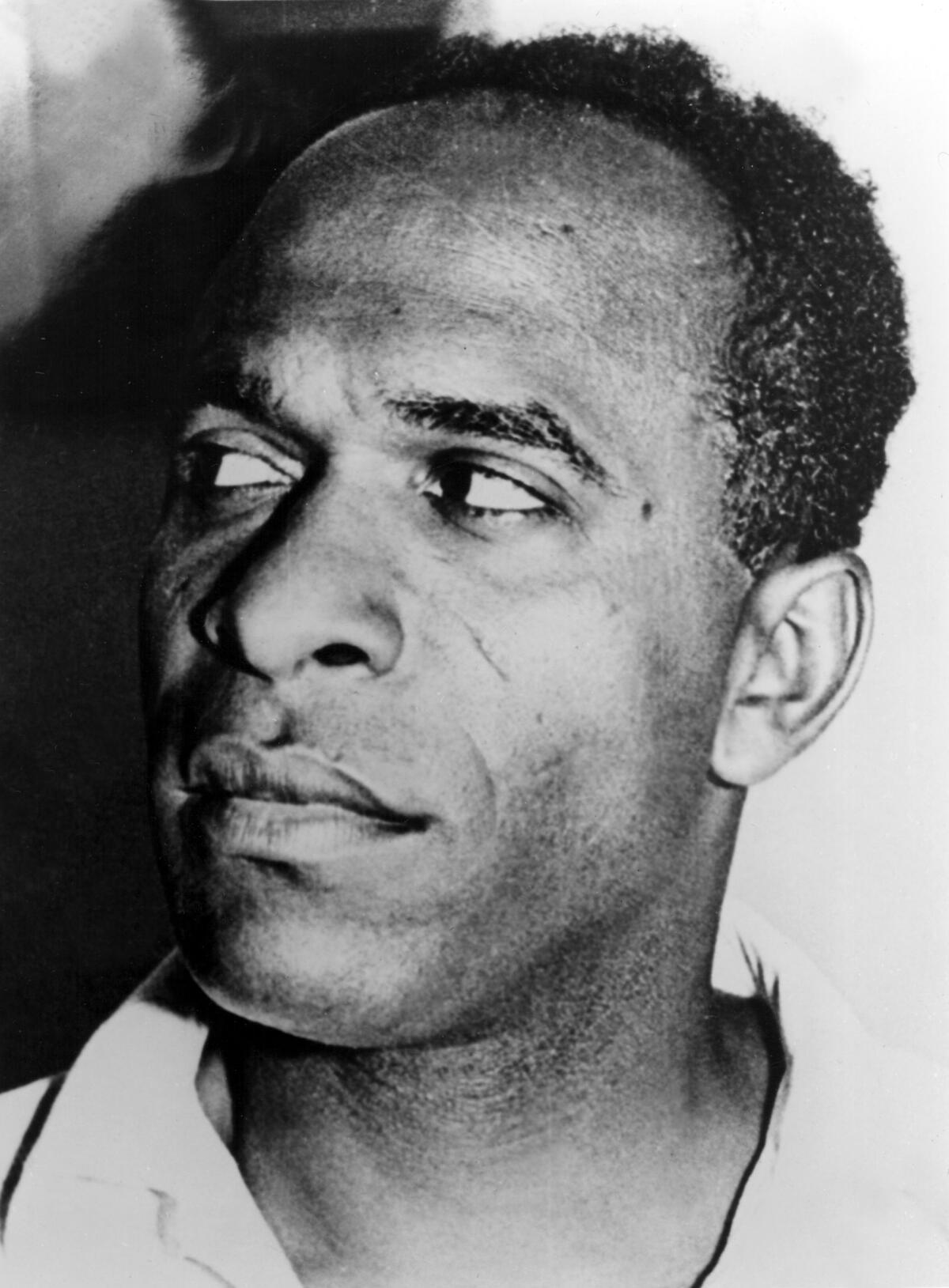
- Share via
On the Shelf
The Rebel's Clinic: The Revolutionary Lives of Frantz Fanon
By Adam Shatz
FSG: 464 pages, $32
If you buy books linked on our site, The Times may earn a commission from Bookshop.org, whose fees support independent bookstores.
In 2021, when Grove Press reissued “The Wretched of the Earth,” Frantz Fanon’s classic manifesto of anti-colonial rebellion, the timing — 60 years after its release and its author’s death — couldn’t be better. The radical thinker’s life had been short and turbulent: Born in Martinique in 1925, he was a clinical psychiatrist in France before reinventing himself as spokesman of the Algerian War and dying of leukemia at 36. But his afterlife has been long and rich.
At the time of his death (ironically in a Maryland hospital, guest of the CIA), “Fanon’s life as a theoretician, a prophet, and an icon of liberation had only just begun,” writes Adam Shatz, author of the riveting new biography, “The Rebel’s Clinic: The Revolutionary Lives of Frantz Fanon.”
Fanon’s thinking on the mental health of the oppressed and the liberating force of violence — “shock therapy for the colonized mind” — was embraced by the Black Panthers, who helped resurrect Fanon in the late ’60s. (Eldridge Cleaver called “The Wretched of the Earth” the “Black Bible.”) In the decades since, his books have made their way into academic canons from postcolonial theory to cultural studies, influencing work on decolonization, anti-racism, Afro-pessimism and more.
The Palestinian cause — and hostility toward Israel — has shifted from the sidelines of student activism to a robust political movement at U.S. colleges.
But, above all, it was the Black Lives Matter explosion in summer 2020 that brought Fanon back into the public eye. In the New Yorker, Pankaj Mishra explained Fanon’s pertinence in the moment: “One measure of Fanon’s clairvoyance — and the glacial pace of progress — is that, in its sixtieth year, ‘The Wretched of the Earth’ remains a vital guide both to the tenacity of white supremacy in the West and to the moral and intellectual failures of the ‘darker nations.’”
The summer of George Floyd cemented Fanon’s image as an intellectual patron saint of the movement for racial justice; recent protests of the Israel-Hamas war have only brightened his aura. Like Che and Lumumba, he has become as much a legend as a historical figure.
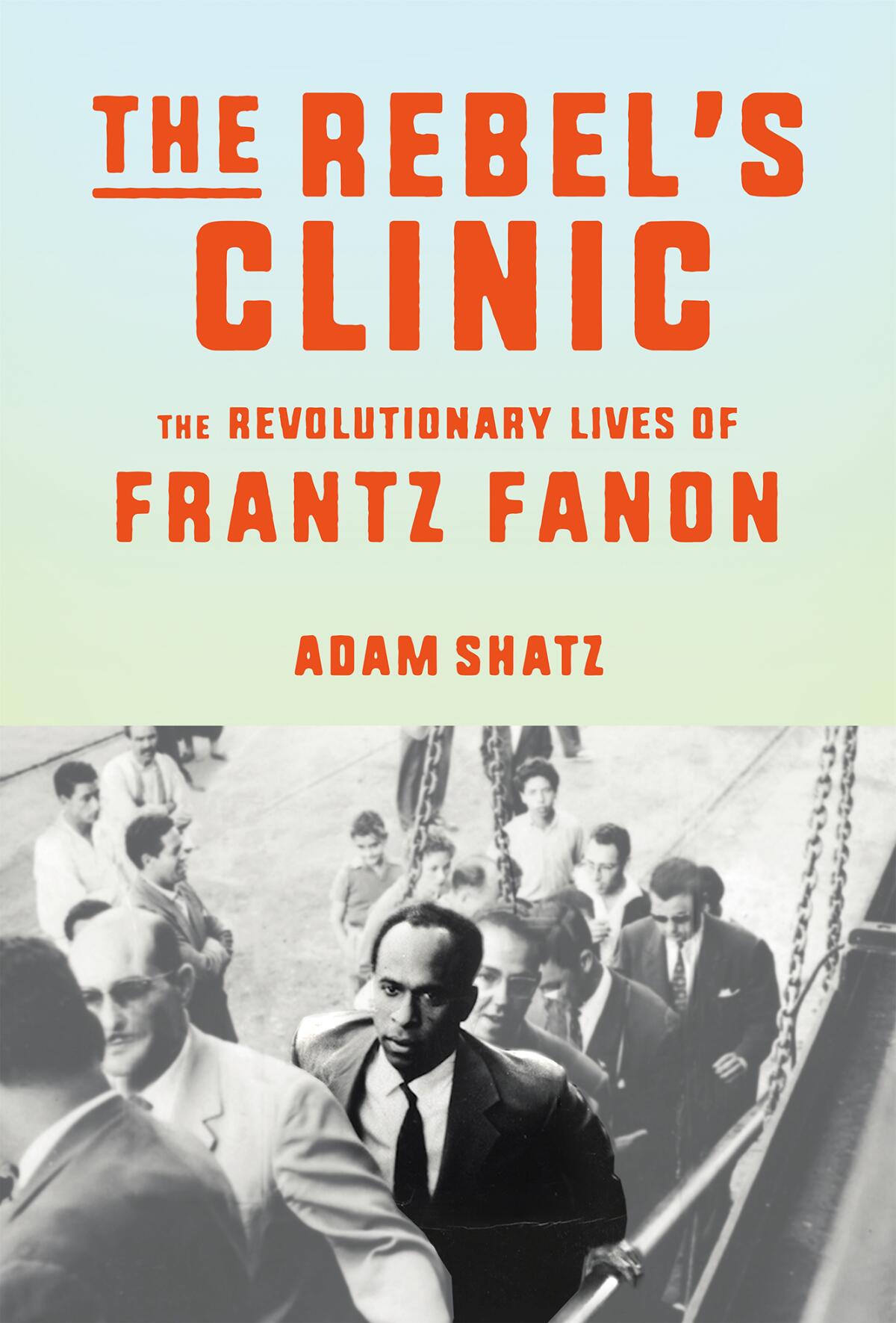
But who was Fanon, and how did his life and thinking fit into the currents of his own era? How did he evolve from the publication in 1952 of “Black Skin, White Masks,” his exploration of the “lived” experience of Blackness, to “The Wretched of the Earth,” his “last testament,” written feverishly — and in failing health — in the final throes of Algeria’s war for independence from France?
Shatz, who has reported from Algeria and written extensively on French and Middle Eastern culture and politics, strives to take in the many dimensions of Fanon’s charged life, its paradoxes and tensions.
“Fanon is someone who wears a number of different masks,” Shatz explained, reclining pensively on the couch of his book-lined Brooklyn apartment. “He’s French, he’s Black, he’s Algerian, he’s West Indian, he’s African. And I think that many of the readings try to freeze him in a particular role. I wanted to see him in a more variegated way.”
Walter Mosley, Luis Rodriguez, the coiner of #BlackLivesMatter and others sketch a hopeful future for L.A. and the U.S. after George Floyd protests.
Shatz has built his “textured, historical” approach around close readings of Fanon’s work as well as interviews with those who knew him firsthand. Fanon’s personal secretary, Marie-Jeanne Manuellan, becomes one of the biographer’s “key informants,” providing an often-neglected perspective. Shatz says he was particularly interested in female witnesses to broaden his portrait of Fanon, who is often seen through the “masculine” lens of “power and violence and guns.” (Fanon’s widow, Josie, died by suicide in 1989.)
“Marie-Jeanne became a way to think about the private Fanon,” Shatz said, “his vanity and contradictions, his caprice and his warmth. I felt that through her I could offer a more humane portrait.”
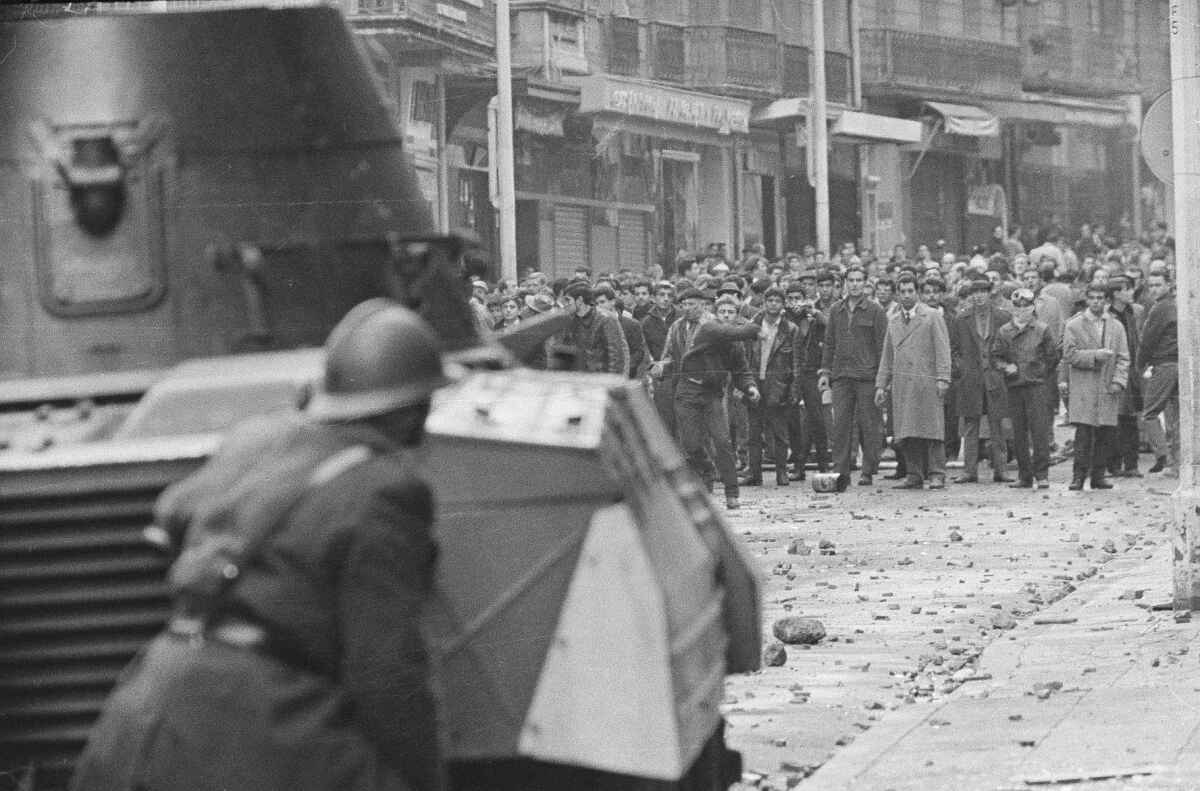
Fanon, the man, comes alive in Shatz’s retelling: He is an “ultrasensitive soul,” easily wounded, judgmental and combative. He’s also in constant motion, restless, agitated, furiously pacing as he dictates his books to Marie-Jeanne. “He’s like the Charlie Parker of anti-colonial rebellion,” Shatz says. “He compresses it all into this very short time as if he knew he was going to die.”
Fanon’s thinking syncretizes intellectual movements of the time — from Negritude to Existentialism, as well as thoughts on clinical psychology and colonialism — giving them voice in a dramatic style: soaring, sermon-like, poetic. Jean Paul Sartre and Simone de Beauvoir were wowed by him when they finally met in Rome in 1961. “When I held his feverish hand, I felt that I was touching the passion that burned,” gushed de Beauvoir.
Fanon’s theories on violence have often been misunderstood. He hails its power to awaken consciousness but also warns of the psychic trauma it can cause. In “The Wretched of the Earth,” he argues: “For the colonized, life can only materialize from the rotting cadaver of the colonist … At the individual level, violence is dis-intoxicating. It rids the colonized of his inferiority complex, of his passive and despairing attitude.” (“Dis-intoxicating” is Shatz’s own term for what, he says, has been misleadingly translated as “a cleansing force.”)
We asked leading writers from a range of backgrounds to recommend books to help understand the Israel-Hamas war. Here are 14 titles to start with.
Unfortunately, there will be those who see Fanon’s imprint in Hamas’ brutal October 7 attack on Israel. That would be another misreading. As Shatz wrote in an essay for the London Review of Books in November, while Fanon was alert to the fury and “vengeful pathologies” of the colonized, he never advocated the massacre of civilians.
“When I wrote this book, I thought it’s going to be read through the prism of Black Lives Matter,” Shatz reflected with some resignation. “And now it seems the book is going to be read through the prism of Israel and Gaza.”

And yet there are many ways in which Fanon was prophetic, Shatz says — though not always in ways he imagined. His predictions of power relations in independent Africa were surprisingly on target. To read “The Wretched of the Earth” today, Shatz writes, “is to be struck by the prescience of Fanon’s warnings about the obstacles to post-colonial freedom: corruption, autocratic rule, xenophobic nationalism, the lingering injury of colonial violence, and the persistence of underdevelopment and hunger.”
Indeed, Fanon’s work continues to resonate with a new global “wretched of the earth” — political and economic refugees and migrants, the permanently marginalized and impoverished, even prisoners. Shatz, who teaches in the Bard Prison program in upstate New York, says the inmates he works with immediately related Fanon’s idea of the “white gaze” to their experience of an “incarcerated gaze.”
Fanon’s “revolutionary lives” —as thinker, writer and committed man of action — remain powerful examples for our own times. “I really think that Fanon is the analyst of the modern condition — like Freud, like R.D. Laing, like Oliver Sacks,” Shatz says. The “common thread” in his life and work, the author believes, is the concept of individual “disalienation,” which is inseparable from the greater fight for liberation.
Santi Elijah Holley’s ‘An Amerikan Family: The Shakurs and the Nation They Created’ tells the full story of the radical Black family that bred late rapper Tupac Shakur.
“I think that’s the consistent thread that runs through all of his writings,” Shatz concludes. “He is a philosopher of freedom.”
Tepper is curator of international literature at City of Asylum in Pittsburgh.
More to Read
Sign up for our Book Club newsletter
Get the latest news, events and more from the Los Angeles Times Book Club, and help us get L.A. reading and talking.
You may occasionally receive promotional content from the Los Angeles Times.

